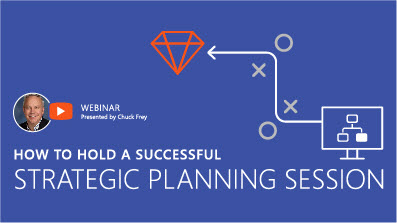By: Chuck Frey (Guest Blogger)
Join us for our upcoming webinar with Chuck Frey on August 7th, titled “How to Hold a Successful Strategic Planning Session”. Register today!
For decades, project managers have toiled away in relative obscurity in the trenches of organizations, balancing time, resources and manpower to efficiently get things done. Strategic planners have operated at a 50,000-foot level, envisioning the company’s opportunities and building high-level plans to define its direction.
Never the twain would meet.

But those days are gone. Today, many companies are struggling to translate their strategic visions into well-defined projects that can carry it out. Project managers are ideally positioned to do a better job of influencing the organization’s strategy, and doing a better job of connecting the organization’s strategy to its projects. In the process, they can increase their value to their firms and enhance the profile of what has largely been viewed as a tactical role.
Too often, strategic plans are created that are unrealistic and unachievable, because they lack the clarity needed for project teams to easily translate them into successful action plans. This can result in months of miscommunication and misdirection, wasted capital, squandered manpower and strained morale, as project teams struggle to operationalize poorly conceived and expressed strategies.
When project managers and strategic planners work together, they are able to develop strategic plans that can more easily be turned into actionable projects. In the process, their collaboration can do a more consistent job of guiding and propelling the firm into the future.
New skills for the strategic project manager
Traditional project management skills have not become outdated. Rather, they are no longer sufficient by themselves. Project managers need to adopt a broader mindset, thinking about how the projects they manage connect with the corporate strategy.
Here are several ways that project managers can expand their skill sets to take on a more strategic role:
Critical thinking:
Project managers need to learn how to drill down to uncover the root causes of situations. They need to be willing to challenge existing mindsets and beliefs.
Environmental scanning:
To take on a more strategic role, project managers need to cultivate the skill of scanning the horizon for weak signals and new developments that could be bellwethers to major shifts in the technology, competitive, economic or regulatory landscapes. Often, game-changing information first appears at the periphery of an industry, and isn’t taken seriously by most organizations.
To improve your scanning ability, expand your external network. Seek out many types of inputs. Don’t discredit anything. Instead, ask yourself, “What could this mean to our company?”, “What would be the impact if this technology dramatically improved?” and other open-ended “What-if?” questions.
Lateral thinking:
Lateral thinking means, literally, to think sideways. Instead of working in head-down mode, looking straight ahead, project managers need to hone the skills of anticipating the potential impacts of new technologies, rivals and other drivers of change.
They also need to scan related industries for strategies and approaches they can adapt to their current situation. Solutions don’t need to be totally new to the world; others have solved similar problems. Find them and learn from their approach and the thinking behind it.
Creative thinking:
In today’s turbulent business environment, maintaining the status quo may be the riskiest strategy of all. Executives responsible for formulating corporate strategies need to consider new possibilities – product lines, services, strategic relationships, business models and more. Project managers can significantly increase their value by understanding the basic principles of creative problem solving, ideation and selling their ideas.
For this mindset, the project managers may actually bring a potent “edge” to the table. Because they aren’t familiar with “the way we do strategic planning around here,” they may come up with new ideas, approaches and possibilities that their more seasoned counterparts may have overlooked.
Synthesis:
An effective strategic leader doesn’t give into the temptation to jump at the first “right answer” that comes along. He or she patiently synthesizes information from many sources before developing a viewpoint.
How can project managers develop these skills?
Here are several practical ways in which project managers can learn to think like strategic planners:
Exposure to realistic case histories:
This type of learning enables the project manager to review and reflect upon challenges, actions and results undertaken by other planning teams. They can absorb the lessons learned and discern how to adapt them to their organization’s current situation.
Seek a mentor who is an experienced strategic planner:
As in many professions, one of the best ways to learn about the art and practice of strategic planning is to learn from someone who is experienced in it. An ideal way to do this is in a master-apprentice type of relationship. The project manager can learn by doing and receive ongoing feedback from his or her counterpart.
Practice scenario-based decision-making:
This is an excellent way for project managers to experiment and gain insights into cause-effect relationships in a safe, “What if?” type of environment. This can be done via a mentor-mentee relationship.
The time to start is now
According to the Project Management Institute, project managers face unparalleled opportunities to help lead their organizations into the future. They can do so by expanding their skill sets to include strategic planning, and by building relationships with their strategic planning counterparts.
Doing so benefits both parties: The strategic planner can better understand the challenges of translating strategy into project plans, and the project planner can gain a new appreciation for the importance of aligning his or her project plans with a realistic but far-reaching corporate strategy.
Both parties benefit – and so does the organization.
Want to learn more about strategic planning?
You’re in luck! Chuck Frey will be joining us for a live webinar on August 7th to further discuss the ins and outs of visual strategic planning. In it, he’ll provide expert tips on each stage of the strategic planning process, including:

- Before: Tips for advance preparation to set you up for success
- During: Strategic models, tools and technology for a great experience
- After: Don’t drop the ball now! How to keep momentum and energy
Register for the webinar today, and join us to learn everything you need to run incredible strategy sessions, whether it’s your very first or your forty-first session!

